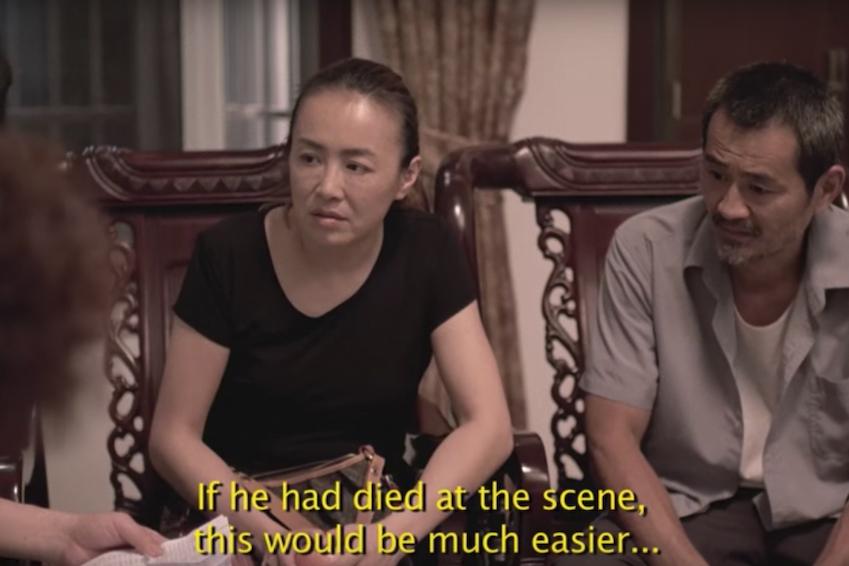The spirit of film noir lives on in Johnny Ma’s Old Stone, a downward spiral set in contemporary China. In the outline of the classic noir, a person makes one wrong move which sets in motion an inexorable series of disastrous events: Fred MacMurray sells a fishy insurance policy to Barbara Stanwyck in Double Indemnity; Tom Neal picks up a good-looking hitchhiker in Detour. The bitter irony in Old Stone is that this particular spiral is set in motion when a man makes a right move—or at least a generous, unselfish one. His gesture, in trying to save someone’s life, brings down a rain of Biblical calamities.
Our humble protagonist is taxi driver Lao Shi, played by weary, middle-aged everyman Chen Gang. Out first glimpse of the incident that causes so much woe is appropriately chaotic: We see the aftermath of a traffic accident, in which a young motorcyclist is seriously wounded. Lao was driving his cab when a drunken passenger distracted him enough that he ran into the biker. The wounded man appears to be dying on the street, and no ambulance is nearby. Some onlookers tell Lao he should drive the wounded man to the hospital, others shout not to touch him. In the few seconds available, Lao decides to save the man’s life and hustle him to the emergency room.
If there is a reward for being a good Samaritan, it’s not evident here. By not waiting for the ambulance to come, and by signing a form when he delivers the unconscious man to the hospital, Lao makes himself responsible for the cost of treatment. And because the wounded man goes into a coma that could last indefinitely, this financial burden—however absurd—will wipe out Lao’s modest life. The repercussions expose the inequities of the society; for instance, in one grueling scene, Lao’s ambitious, practical wife (Nai An) throws herself at the feet of a lawyer, a family friend, when she and Lao visit the lawyer’s home to beg for help in getting out of the financial liability. It’s not just the humiliation of the have-nots in that scene; it’s the way the lawyer won’t get off his phone, and the fact that the TV is blaring throughout the entire encounter. Are there any life events worth turning off the TV to discuss?
So Old Stone has some urgency as a social-issue picture in the way it probes different levels of corruption in China. That Yao must obsequiously bring cigarettes and fresh melons to officials and police just to get their ear for a moment is a fascinating social ritual that involves casual bribery and feigned indifference. But the film also has the psychological underpinnings of noir, because there’s a sense that Yao’s own stubbornness is partly the cause of his ruin—stubbornness, or maybe a naive belief that doing the right thing is its own reward.
This tough film doesn’t have much patience for that kind of platitude. Old Stone is the first film of writer/director Johnny Ma, who was born in Shanghai and raised in Canada. He based the story on real-life reports of Chinese hit-and-run drivers who deliberately kill their victims because it’s cheaper to pay for a funeral than the medical bill for injuring someone. Not surprisingly, the result is a cynical tale, with an especially poisonous bite in its final moments. (By the way, Ma borrows the end-credits song from Hou Hsiao-Hsien’s The Assassin, an acceptable theft under these circumstances.)
Such a grim scenario might get monotonous were it not for two factors: The film clocks in at a no-nonsense 80 minutes, and a third-act revelation makes for a very satisfying shift in emphasis. Does a movie like Old Stone change anything, especially in a system as convoluted as modern China? Maybe not, but its scream from the depths is eloquent. Old Stone, Not rated. Opens Fri., Dec. 2 at Grand Illusion. film@seattleweekly.com






